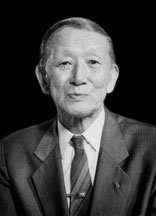This article needs additional citations for verification. (June 2014) |
Shinichi Suzuki 鈴木鎮一 | |
|---|---|
 | |
| Background information | |
| Birth name | Shinichi Suzuki |
| Also known as | Shin'ichi Suzuki |
| Born | 17 October 1898 Nagoya, Japan |
| Origin | Japan |
| Died | 26 January 1998 (aged 99) Matsumoto, Japan |
| Genres | Classical |
| Occupation(s) | Musician, violinist, pedagogue, philosopher |
| Instrument | Violin |
| Spouse | Waltraud Prange |
Shinichi Suzuki (鈴木 鎮一, Suzuki Shin'ichi, 17 October 1898 – 26 January 1998) was a Japanese violinist, philosopher, composer, and educator and the founder of the international Suzuki method of music education and developed a philosophy for educating people of all ages and abilities. An influential pedagogue in music education of children, he often spoke of the ability of all children to learn things well, especially in the right environment, and of developing the heart and building the character of music students through their music education. Before his time, it was rare for children to be formally taught classical instruments from an early age and even more rare for children to be accepted by a music teacher without an audition or entrance examination. Not only did he endeavor to teach children the violin from early childhood and then infancy, his school in Matsumoto did not screen applicants for their ability upon entrance.[1] Suzuki was also responsible for the early training of some of the earliest Japanese violinists to be successfully appointed to prominent western classical music organizations. During his lifetime, he received several honorary doctorates in music including from the New England Conservatory of Music (1956), and the Oberlin College Conservatory of Music, was proclaimed a Living National Treasure of Japan, and in 1993, was nominated for the Nobel Peace Prize.[2]
- ^ Suzuki 1978, p. [page needed]
- ^ Wood, Enid. "Shinichi Suzuki (1898–1998): A Short Biography". Retrieved 19 April 2013.